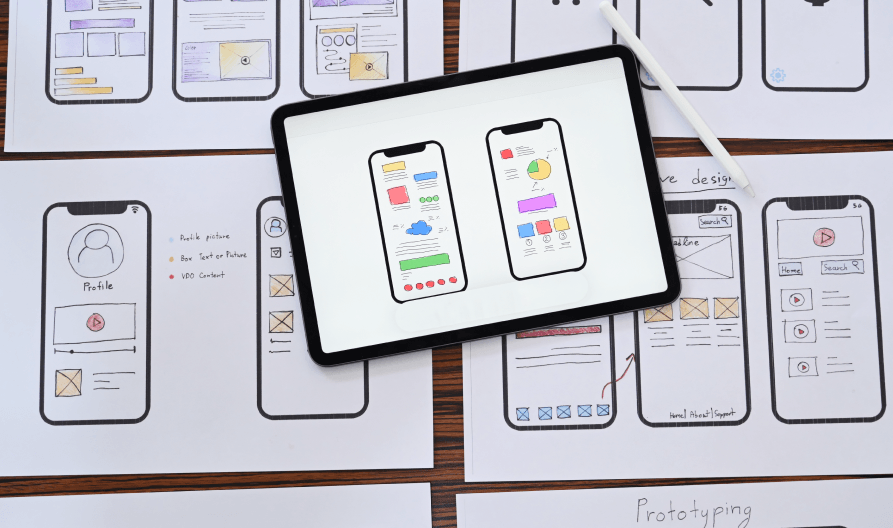For many companies turning to the services of application developers, it is important to understand what they need to demand from their implementers. It is for this reason that novice performers need to understand the basics as well.
What Is a Mobile Application?
A mobile version of a site is a modified, and in some cases adapted, web page design and content for easy viewing on a smartphone display. The app will look much more progressive.
But what are mobile apps? These applications are downloaded and installed by the user through mobile marketplaces.
Some of the largest marketplaces are AppStore and Google Play. Technically, all types of mobile application are created for a specific platform of the mobile gadget. The most popular operating systems are iOS, Android, Windows Phone.
An application for mobile platforms is understood as a software package, the functionality and design of which are "fine-tuned" to the capabilities of mobile platforms.
Types of Mobile Applications
In this article we will look at the most understandable different types of mobile apps. Here are the most popular categories of mobile apps:
1. Native Mobile Apps
2. Hybrid Mobile Apps
3. Cross-platform Mobile Apps
4. Web Apps
5. Progressive Web Apps
And also, we will give you all the information to help you choose.
1. Native Mobile Apps
It is best to think of native mobile apps as apps written in the same language as the operating system on which they run. Because native mobile apps are written in the same language as the operating system, they can take full advantage of all the features and functions available in that operating system.
This means that they are more responsive, more secure, and consume less battery power than web apps.
Web apps, on the other hand, are written in languages such as JavaScript or HTML5 and run in a web browser, which means they have to be translated into a native mobile application types each time they are installed.
A native mobile app is an app that runs on the device's operating system. Native apps are created using the same programming language as the operating system, so they can take full advantage of the device's hardware and software capabilities.
Advantages of native mobile apps:
The main advantage of native applications is that they are more efficient than web applications because they do not need to load additional code at startup or run. Web applications also require a network connection, which can make them slower than native types of mobile applications. They are not affected by changes made by the carrier or manufacturer.
Disadvantages of native mobile apps:
While native mobile apps have some advantages over web apps, they also have some disadvantages.
Because they are downloaded from the app store rather than accessed through a browser search engine (such as Google), users may have difficulty finding them unless there is an active marketing campaign behind them; this means that developers need to have specific marketing plans in place before launching any new product or service line.
Examples of Native Mobile Apps

2. Hybrid Mobile Apps
If you're looking for a way to develop apps that offer the best of both worlds-the performance and reliability of native apps and the convenience and simplicity of Web apps-you might want to consider hybrid mobile apps.
When people talk about hybrid mobile apps, they mean software that uses two different programming languages: one for the frontend (user interface) and one for the backend (server).
The result is an application that has some of the benefits of native software, but also some of the benefits of working with web technologies.
A hybrid mobile app will have access to all the native functions of the device, such as GPS, camera, contacts, calendar, etc. This is one of the main advantages of using a hybrid mobile app compared to a mobile website or native app.
Advantages of hybrid mobile apps:
They can be deployed quickly because no additional coding languages or tools are required to create them.
They also have a lower cost of ownership than native apps because they eliminate the need for development teams specializing in each platform's programming language (if you create an iOS app, you need someone who knows Objective-C; if you create a Windows Phone app, you need someone who knows C#).
Disadvantages of hybrid mobile apps:
The main disadvantage of using a hybrid app is that it does not have access to all the APIs that are available by default on the iOS or Android platforms.
However, this problem has been solved with the help of various frameworks, such as PhoneGap, which allow developers to access most of the APIs needed to create powerful apps without knowledge of programming languages such as Objective-C or Swift.
Examples of Hybrid Mobile Apps
3. Cross-platform Mobile Apps
Cross-platform mobile apps are apps that run on multiple platforms. They allow you to develop an app that can run on iOS, Android, Windows 10, and other platforms.
Cross-platform mobile apps allow developers to create an app for multiple platforms rather than developing separate versions for each platform. They are usually created using a cross-platform framework.
The most popular framework for developing cross-platform applications is React Native.
Cross-platform mobile apps are advantageous because they can be used on both Android and iOS devices without requiring users to download new versions of the app or even update the operating system; they also help save time and money by allowing you to develop once instead of twice. It's a great solution for companies that want to reach potential customers everywhere.
It's also good for developers who want to create an app once and run it on different devices.
Advantages of cross-platform mobile apps:
They are great because they allow you to create an app once and make it work on multiple devices. Cross-platform mobile apps are great because they allow you to reach more people with your product or service.
If you want to reach customers from mobile devices but don't want to be limited to one platform, cross-platform mobile apps may be right for you. However, there are drawbacks as well!
Disadvantages of cross-platform mobile apps:
However, cross-platform mobile apps have disadvantages: they are slower, less stable, and more limited in functionality than native apps.
For example, if you want your app to work on iOS and Android, you need two different codebases (and two different commands). This can be expensive and time-consuming if you're not careful.
Also, mobile app development services can cost a lot of money, especially if your business is small and just starting out. Also, it takes a lot of time for an app developer to build and test a cross-platform mobile app before it's ready to be released for sale (i.e., when customers can download it from the app store).
Examples of Cross-platform Mobile Apps

4. Web Apps
Web Apps are a new way to interact with the Internet. Instead of web pages, you use apps. Web Apps are very similar to mobile apps, only they run in a browser and don't require installation on your phone. Web apps make it easy to access information from any device at any time.
You can find out directions from your phone, check your email from your laptop, or buy something online from your tablet.
Web apps are especially useful for mobile users who want to take advantage of the convenience of mobile apps while at home or working on a computer, because they don't need to download or install anything; all they need is an Internet connection and a browser that supports web apps (Chrome or Firefox).
Web apps are also good because they can provide features that traditional Web sites don't have.
Advantages of web apps:
Web apps are good because they allow you to access your data from anywhere, anytime. You don't have to download the mobile applications to your phone or tablet; all you have to do is visit the website, and your data will be there waiting for you.
Web apps are also advantageous in that they don't take up space in memory or on your device's hard drive.
Disadvantages of web apps:
Surprisingly, the disadvantages of such applications are not as many as they seem. First of all, they do not work in offline mode (you need an Internet connection).
In addition, the design of such applications is usually not much different from the usual browser page, as the interface is mostly related to the browser from which you entered the site.
Examples of Web Apps
5. Progressive Web Apps
Progressive web apps are apps that can be installed like traditional mobile apps but do not require an app store. PWAs are web apps that take advantage of new web standards to create an experience similar to native apps or mobile websites.
PWAs combine the best features of web technologies (e.g. open standards) with the best features of native apps (e.g. fast loading time and the ability to run offline). PWA works by providing a "shell" for your site that gives users an experience similar to what they would expect from a native types of mobile apps on their device.
It's important to note that this "shell" is not really an app-it's just a specialized version of your site that can adapt depending on when users are online or offline.
Advantages of progressive web apps:
They're lightweight and fast, so they load faster than traditional websites, and they're also more reliable. They also work in any browser or device, so you don't have to install an app on your phone to use them.
And PWAs can be used by anyone with a browser: you don't have to have iOS or Android devices to take advantage of these apps!
Disadvantages of progressive web apps:
To be honest, there doesn't seem to be any downside. Together, these standards allow you to create a website or web app that can run offline and has access to all the hardware features available on your phone or tablet. In other words, PWAs are designed to give you a site that feels like an app without having to download anything from the app store.
Examples of Progressive Web Apps

How To Choose Which Type Of Mobile Application To Develop?
Below we will be happy to tell you about the main reasons to choose one or another method of development. The main thing is that you yourself can understand and realize that you need exactly the type you have chosen for your needs.
For this, we will give you a list to choose from.
When To Choose Native Mobile App Development?
Native type of mobile application is a great choice when you want to focus on one platform and create an app that looks and feels native to that platform. It's also not suitable for apps that need to be multiplatform or have different features on each of the devices - for examples of mobile applications, an app that needs access to location data on iOS but not Android.
You can also choose to develop non-native apps if your company has limited resources or wants its app to be available on multiple platforms at once.
When To Choose Hybrid Mobile App Development?
Hybrid mobile app development is the best way to go when:
You want to create a mobile app that works on both iOS and Android. Hybrid apps tend to be less stable and reliable than native apps, however, created using HTML5 or Cordova. Hybrid apps tend to be limited in their ability to include complex functionality and customization options due to the fact that they are web-based (HTML5).
Your users expect more than just basic functionality from a mobile app. Hybrid apps can offer a simple user experience. After all, native apps may not be as accessible as web apps because they are not available in app stores.
When To Choose Cross-platform Mobile App Development?
In today's world, we are all very busy and have little time for anything. So why waste time developing a cross-platform mobile app? The answer is simple. If you want to succeed in the market, you need to use the right technology.
Cross-platform mobile app development is one such technology that can help you succeed in the market.
The best solution for your business if you want to reach a wider audience and make your product available on multiple platforms. This type of mobile app allows you to attract more users and increase sales by offering them an easy way to use your product on different devices.
When To Choose Web App Development?
One of the most popular mobile app types for developers is to build with web-based mobile development tools. However, this approach requires more work compared to other approaches because each platform requires a different set of APIs, user interface design templates, and coding conventions.
There are many reasons why web mobile app development is booming these days, but here are some of them:
Personalization: If you want to develop a customized app for your business, then using web mobile app development will be the best option as it allows developers to create apps based on requirements without compromising on quality and performance.
Cost Efficiency: Web-based mobile apps cost a lot less.
When To Choose Progressive Web Apps?
Progressive Web Apps (PWAs) are a way to make websites more like native apps. They combine the best of both worlds-the convenience and security of web apps and the speed and convenience of native mobile apps.
It's an alternative to a native mobile application. They're a set of web standards that allow developers to create web apps that work like native apps. They combine the best of the web with the best of apps, so you can have a website that feels like an app.
The best thing about PWAs is that they're easy to set up: just create a manifest file and include it in your site code, then add some tags to the HTML. That's it!
Conclusion
Now that you know everything you need to make an informed decision about the type of mobile app that best suits your business needs, it's time to choose what's right for you.
First of all, you need to analyze your company's goals and objectives and find out if there are any gaps in the services your existing website or app currently offers. If you decide that creating a new mobile app is worth pursuing, it's important to think about how much time and money will be spent developing it.
The cost of creating an app varies greatly depending on its size, complexity, and capabilities.
As mentioned earlier, there are many different types of mobile app today, so choosing one can sometimes seem like a daunting task.
However, following the steps above will help you navigate the decision-making process and understand what type of mobile apps platform is best for your project!
Relevant Articles:













































